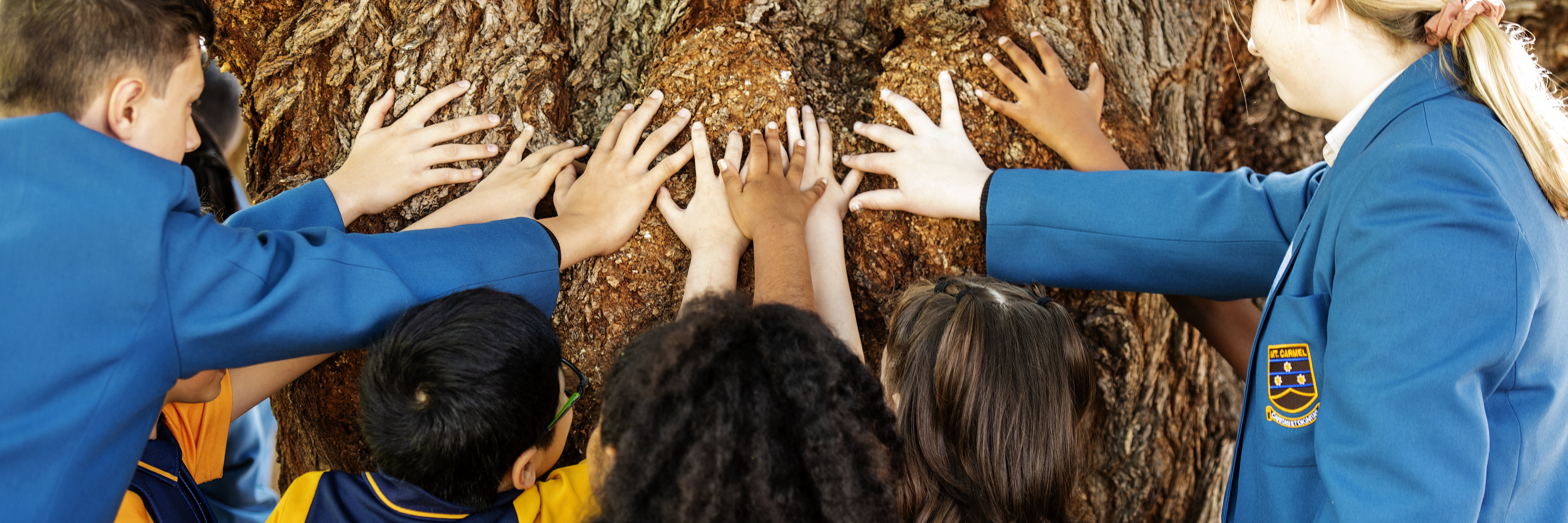
The Key Learning Area of Religious Education at Mount Carmel offers an important contribution to the life and learning of the Catholic school. Religious Education opens a space where students encounter the Catholic Tradition in a meaningful and explicit way, and in a broader sense it can be integrated into the overall education of students.
At Mount Carmel College, we aim to deepen students’ understanding of the Tradition and develop in them an appreciation of its significance in their lives, so that that they may participate effectively in the life of the Church and wider society.
We strive to guide students towards a religious literacy, chiefly within the Christian, and more particularly, within the Catholic Christian tradition. But being open to the wisdom enshrined in other religious traditions, we include modules on Aboriginal beliefs, Judaism, Islam, Hinduism and Buddhism. Students gain a clear sense of the religious tradition with which their families have some connection. They do so in a context of openness and tolerance, in other words in a true ecumenical spirit.
Mount Carmel College endeavours to carry out the spiritual development of its students through our:
Through our curriculum and Crossways, a clear curriculum framework derived from the Universal Catechism of the Catholic Church for the development of teaching and learning within the Key Learning Area of Religious Education, teachers nurture the formation of students in partnership with parents who are the first educators of their children and they join with the broader community of the Church which is the primary locus of catechesis.
JJAMM Week (named after Joseph, Julian, and Mary MacKillop) is a very rewarding and meaningful week during which students are able to honour, reflect upon, appreciate and aspire to the selflessness and kindness of St Joseph, Julian Tenison Woods and Saint Mary of the Cross MacKillop..
To celebrate JJAMM Week, students at the College organise a range of activities throughout the week and funds are raised for a range of Josephite organisations that work with the poor and disadvantaged, both in Adelaide and overseas.
During JJAMM Week, the students at Mount Carmel College generate a sense of participation and fulfilment as every class contributes to JJAMM Week events and fundraisers, which in turn creates a sense of community and accomplishment.
Reflection Days are an opportunity for students to have time away from school and reflect on their lives, their relationships with their family and friends, the world around them, and their relationship with God. Each Reflection Day has a different focus.
For many students their Reflection Day is a powerful experience that impacts on them at the time and continues to stay with them throughout the year. They are a great opportunity for students to take stock of where they have come from and where they’re heading in the future.
Mount Carmel College Secondary Campus has a very active student Social Justice Group (called The Mary MacKillop Team) comprising of students from Years 7-12 who meet regularly to discuss and plan various campaigns and awareness-raising about existing social justice issues and making a difference in the lives of others.
The Social Justice Group has been involved with the:
The Social Justice Group also involves itself in various activities and events outside of school, where they proudly represent the College in making a difference in the areas of injustice.
At Mount Carmel College we encourage students to raise money for Project Compassion throughout Lent. This fundraising effort benefits Caritas Australia, an international organisation charity that helps local and overseas communities in supporting themselves in long term sustainable ways. This includes the building of wells in drought ridden countries and projects for Indigenous communities.
A wide variety of fundraising events and activities are held by students at Mount Carmel College as part of Project Compassion. Within Religious Education classes, focus is spent on where the money raised during Project Compassion goes, the many issues that people in different parts of the world face which lead to poverty and injustice, and how our efforts are linked to the Gospels and the work of Saint Mary of the Cross MacKillop.